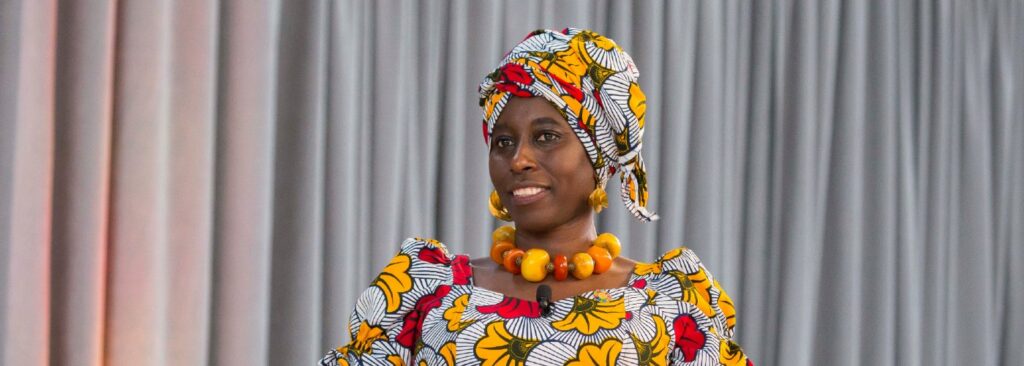Helena Mucharo (55) lives at an altitude of 1,680 meters on the edge of Mount Kilimanjaro forest in Tanzania. This forest is part of Mount Kilimanjaro’s national park where no settlements are allowed. For cooking, Helena always went to the forest to collect firewood. Until the day Mount Kilimanjaro National Park changed its rules and no longer permitted gathering firewood. Unfortunately, this meant that Helena would have to buy firewood – which she couldn’t afford. At the same time, Helena’s health was deteriorating.
All these years she had been inhaling smoke while cooking on an open fire. So something had to change. And it did. In 2012 Helena and her husband made a decision that transformed their lives. They invested in a biogas digester, a clean energy source for cooking and electricity. Since then, everything has improved. Helena’s health and her family’s financial situation are better. And the children can now study at night using a biogas-powered lamp.
Helena and two of her children. Photo: Sven TorfinnTanzania’s energy access situation
Helena’s story is typical of people living in rural Tanzania. Although the number of households with access to electricity has increased, the majority still goes without, which holds back economic progress considerably. And access to modern cooking methods is still very limited. More than 84 percent of rural households still cook on firewood stoves – and unfortunately also suffer health hazards from inhaling smoke.
A women’s burden
Most of this burden falls on women. Traditional roles and responsibilities dictate that women manage their household’s energy needs, especially for cooking. This means they spend lots of time fetching firewood and cooking. As a result, they’re also more exposed to indoor air pollution from using firewood stoves. Then there are other unsafe situations caused by lack of energy. For example, poor lighting in public and at home, unreliable water supply, and severely hampered essential services like health and education.
Women’s needs are footnotes in energy policy planning and implementation.
Women are also less likely to benefit from money-making activities that require energy because men have more resources and time. In general, women’s and men’s energy needs differ significantly. However, women’s needs are underrepresented in the excessively supply-driven energy sector. And they are simply footnotes in energy policy planning and implementation.
The Gender Action Plan
But, in Tanzania, things are changing. In December 2018, the Minister of Energy adopted the Gender Action Plan (GAP) of the Sustainable Energy for All (SEforALL) initiative, the Ministry’s instrument to increase sustainable energy access. With this, the government recognizes the importance of integrating gender perspectives into policy implementation. And it commits to ensuring equal opportunities for both women and men to access and control sustainable energy services, which is also essential for development.
The adoption of the GAP did not happen overnight. A Hivos partner in our Green and Inclusive Energy program played a crucial role. The Tanzania Gender and Sustainable Energy Network (TANGSEN) helped develop, and is now implementing, the plan. In October 2016, TANGSEN conducted a gender assessment of the then recently adopted SEforALL implementation documents. They found them lacking the necessary guidelines and tools for SEforALL to integrate gender perspectives in the plan.
In October 2017, TANGSEN presented their findings and recommendations to the Ministry of Energy, who decided to work with TANGSEN to develop the plan. Together they formed a working group with a variety of stakeholders. These included: Tanzania Electricity Supply Company (TANESCO), Ministry for Local Government (PoRALG), Rural Energy Agency (REA), Energy and Water Utilities Regulatory Authority (EWURA) and the Ministry of Education.
After many consultations and drafts, the final version of the GAP was adopted by the Ministry of Energy at the end of 2018.
From commitments to implementation
Although this is an important first step towards including gender concerns in energy access, it now comes down to implementing the plan. The Energy Ministry appointed a Gender Committee to oversee this, and they turned to TANGSEN for assistance. TANGSEN is now training the Ministry, energy institutions, district level governments and the private sector to integrate the energy needs of women in their planning.
Major steps have been taken to include the energy needs of women like Helena
Previously, all planning was done in Dar es Salaam and programs were centralized. They focused only on energy supply – not the specific needs of communities, let alone women. Now, TANGSEN is calling for a decentralized approach focusing on household use and demand. The importance of decentralization has recently gained momentum, with districts drawing up actionable plans and budgets for energy access. The next step is to create a favorable environment with energy departments at district level and by prioritizing energy in district development plans. Something TANGSEN is committed to keep pressing for.
Time will tell, but the first major steps have been taken to include the energy needs of women like Helena and reap the full benefits of gender-sensitive energy planning.
The Hivos Green and Inclusive Energy Program
Our aim is to see the world switch to green and inclusive energy systems by providing universal access through decentralized renewable energy. In 2016, Hivos, ENERGIA, IIED and national civil society organizations (CSOs) partnered with the Dutch Ministry of Foreign Affairs in a five-year advocacy program to influence energy policies at all levels. The program is running in Indonesia, Nepal, Kenya, Tanzania, Zimbabwe, Malawi, Nicaragua and Guatemala.
In Tanzania, Hivos collaborates with, amongst others, the TANGSEN so that policies and implementation ensure gender inclusion. The focus is on increasing opportunities that allow women greater and more productive participation in politics, society and the economy.
This article is part of a series published in the final year of a unique five-year-long strategic partnership between Article 19, Hivos, IIED and the Dutch Ministry of Foreign Affairs. Under the ministry’s Dialogue and Dissent program, Hivos has aimed to strengthen the influencing power of civil society around the world. You can find more of these inspiring examples in Raising voices around the world.





